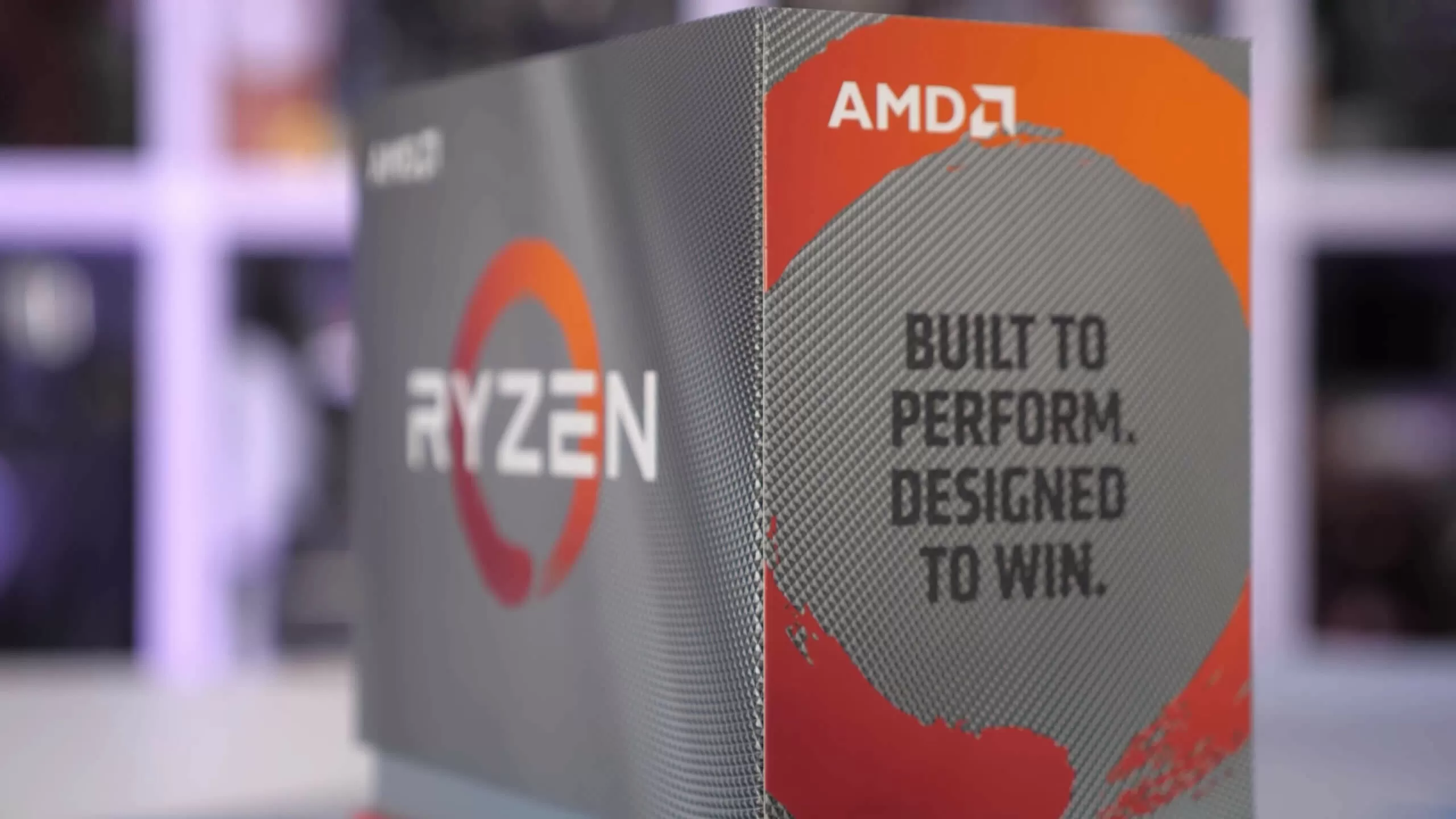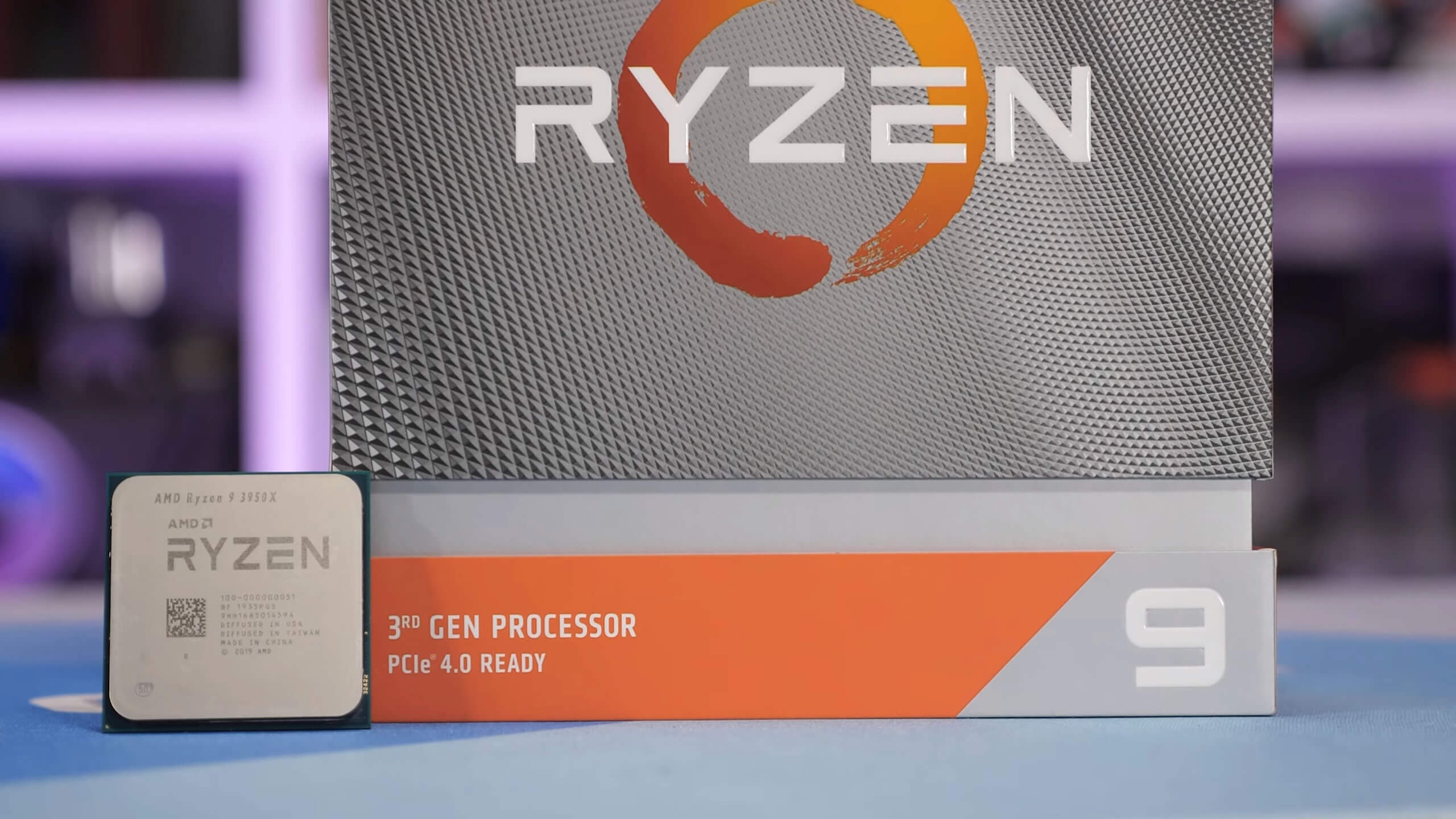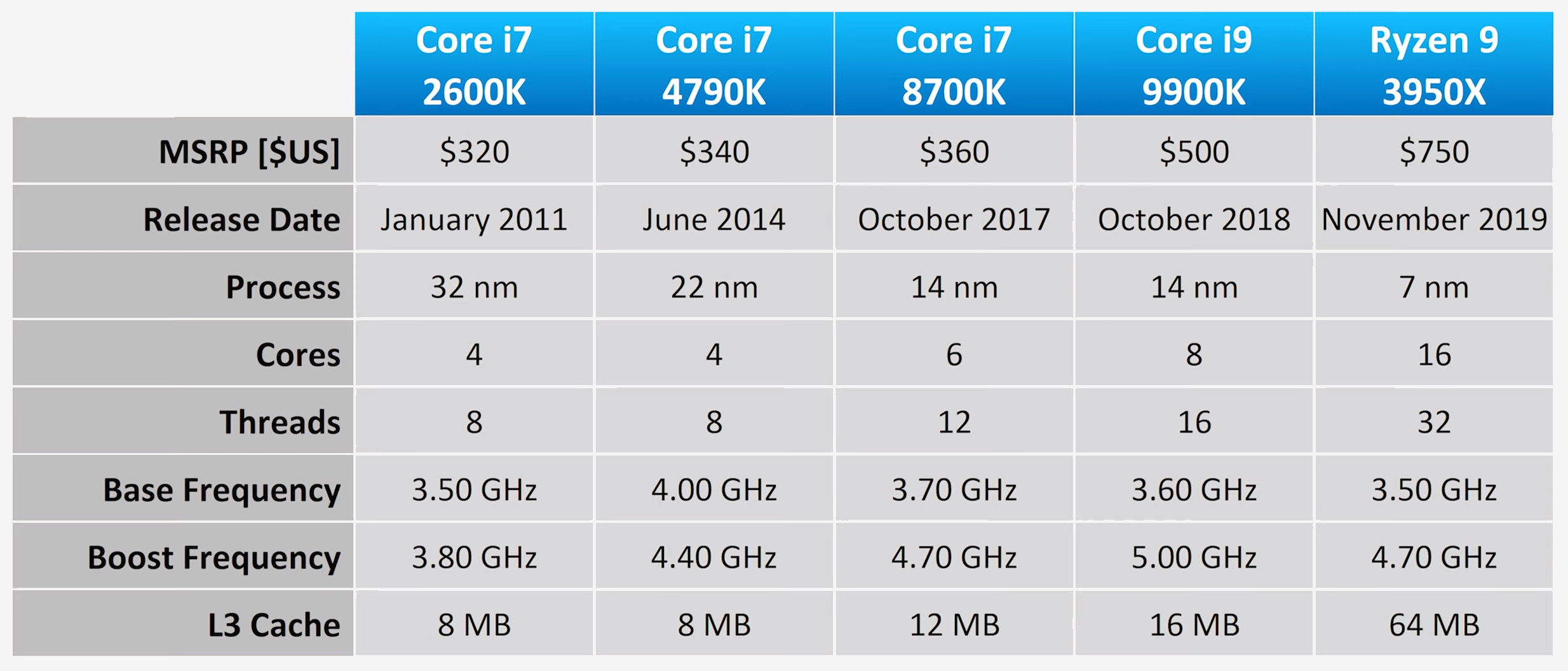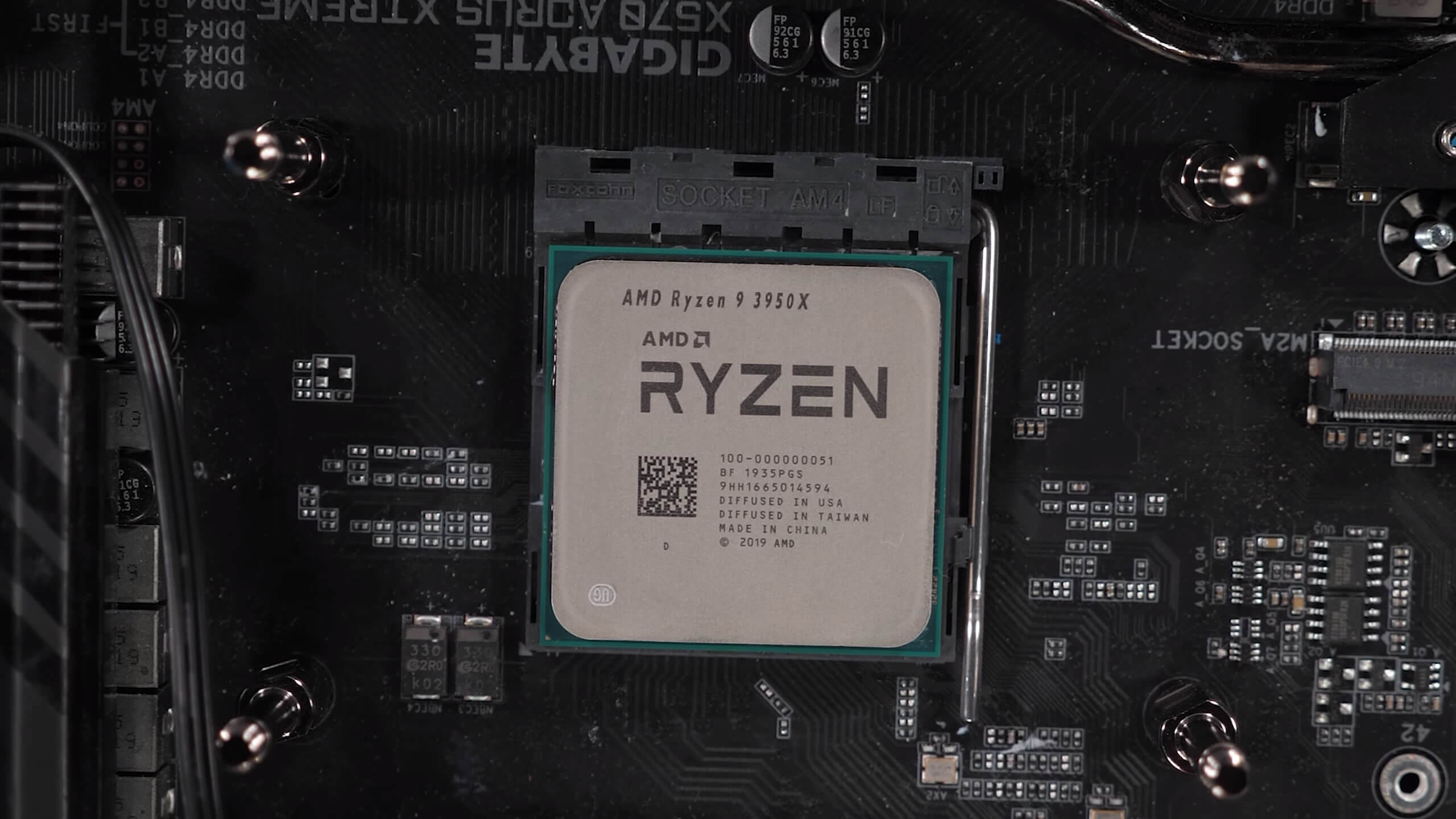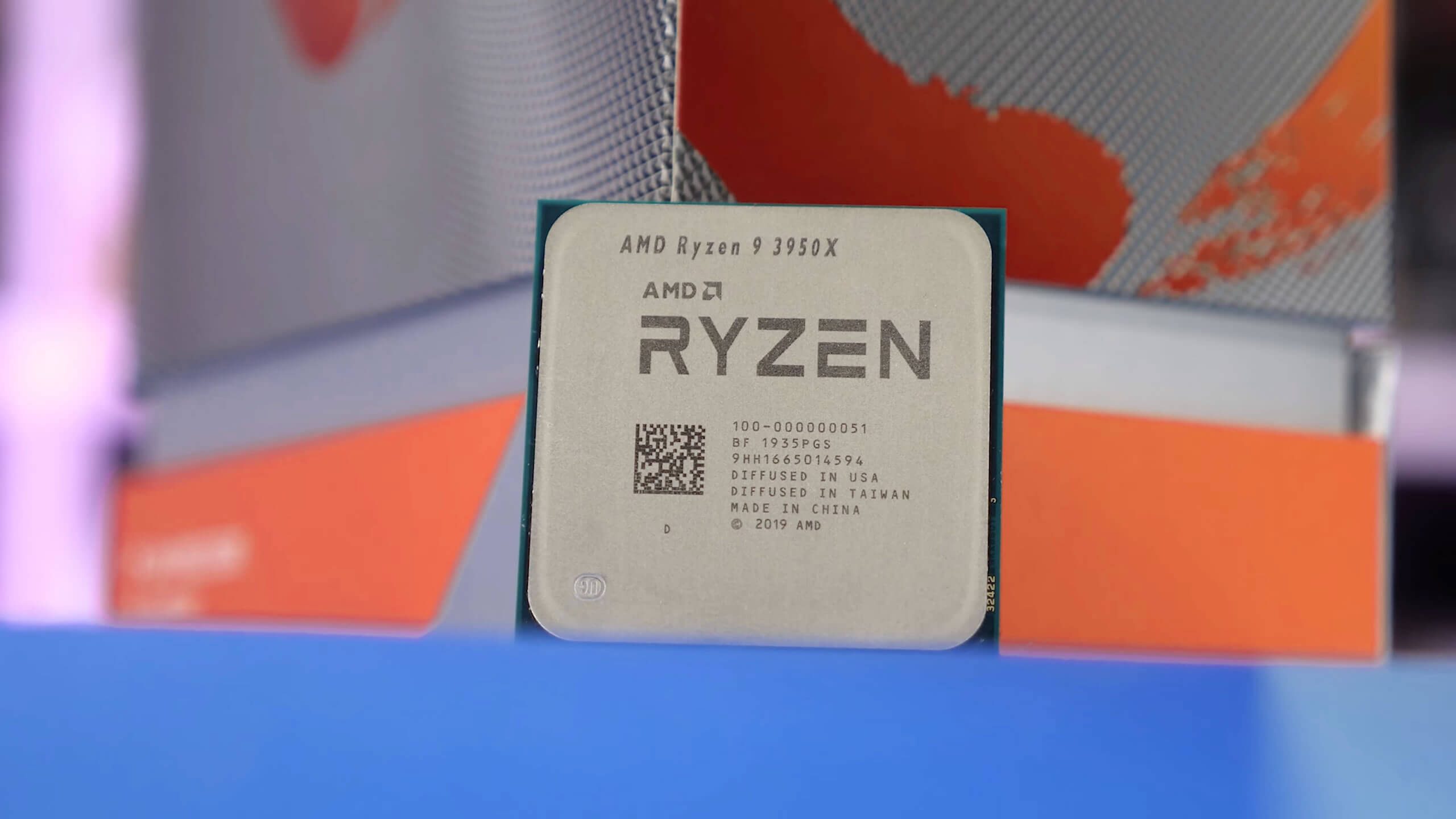Today we finally get to show you how the Ryzen 9 3950X performs. Earlier this year at Computex we weren't sure if we'd see a 16-core AM4 CPU happen, but AMD put that one to rest when it announced the 3950X later on at E3. Originally due to hit shelves in September, AMD pushed the release a couple of months and is now slated to go on sale November 25. That means you get to see all the performance figures and data well ahead of launch.
That's good news considering the 3950X is not inexpensive. At $750 it still does well relative to the Intel competition though. The 8-core 9900K, for example, currently retails for $500, so paying 50% more for 100% more cores, that might end up being a rather good deal.
The Ryzen 9 3950X does look to bridge the gap between mainstream and high-end desktop platforms, at least existing high-end desktop platforms. Third-gen Threadripper will change that later this month. But the point is that never before have we had such an extreme CPU on a mainstream platform, and this is certainly the most expensive mainstream platform CPU we've seen in a long time.
The Core i7-2600K came in at $320, the 4790K retailed for $340, the 8700K pushed up to $360 and now we have the Core i9-9900K at around $500. The Ryzen 9 3900X was a big deal for AMD, matching Intel at the $500 price point, and legitimately as well, not like what they did with the 1800X.
... the 3950X puts AMD in the position to command a price premium for desktop computing. But is their new 16-core/32-thread monster worth the asking price?
But the 3950X goes beyond that and that puts AMD in the position to command a price premium for desktop computing. But is their new 16-core/32-thread monster worth the asking price? Given what we've seen from the 3900X, you'd think it would be if you can put all those cores to work, but of course we'll run a few tests and get to the bottom of it.
In terms of specifications, the 3950X is similar to the 3900X: you get 16 cores opposed to 12, and the boost clock speed has been raised by 100 MHz, presumably due to the 3950X getting better silicon. But in order to keep within the 105w TDP, the base clock has been dropped from 3.8 GHz down to 3.5 GHz, though we're expecting the all-core clock frequency to be similar.
Another difference between these two CPUs is packaging: the 3900X comes bundled with the Wraith Prism RGB cooler, while the 3950X doesn't come with a cooler at all, so you will need to factor in the added cost of a quality cooler.
For testing we're using the new Corsair HydroX cooling gear on the Gigabyte X570 Aorus Xtreme. For the block we've used the XC7, the XR5 360mm radiator and the XD5 pump/reservoir combo, all on the Praxis WetBench. Eventually we'll upgrade all this into a proper test case but due to limited time this is what we have for now. We've also used this setup to re-test the 3900X, 3800X and 3700X, updating the results where necessary. We're also using DDR4-3200 CL14 memory for all current AMD and Intel processors.
The 8th and 9th-gen Intel Core processors were benchmaked on the Gigabyte Z390 Aorus Ultra, cooled using the Corsair Hydro H115i RGB Platinum 280mm all-in-one liquid cooler. Note the Intel CPUs are not TDP restricted, so we are showing the best case scenario for out of the box performance. Finally, the graphics card of choice was the MSI Trio GeForce RTX 2080 Ti. Let's now get into the benchmark results...
Benchmarks
You can see why Intel has been trying to downplay Cinebench's relevance for CPU performance, the 3950X is a whopping 89% faster than the 9900K, so for those of you who use Maxon's Cinema 4D, the 3950X is well and truly worth the premium over the 9900K. That's quite the Cinebench R20 score.
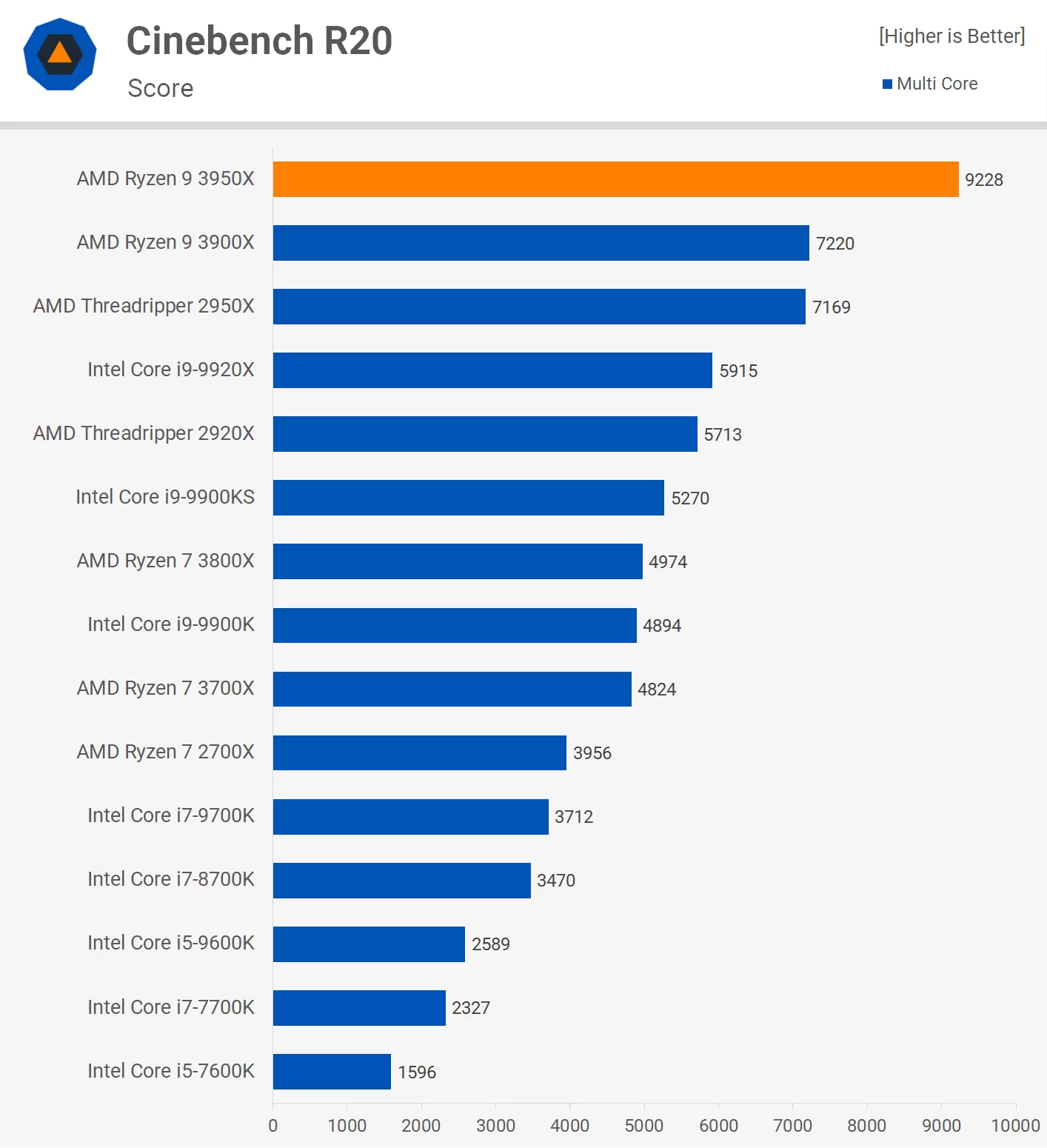
The 3950X was also 27% faster than the 3900X and while that does make it worse value, if time is money then the premium will be easily justified. While I suspect 2950X owners will be holding out for 3rd-gen Threadripper, those thinking of snapping up the 2nd-gen 16-core processor will want to get it for $500 or less given the 3950X is almost 30% faster. Of course the 2950X offers more PCI Express lanes, but if you can make do with an X570 board, then the 3950X will be the better option.
That 4.7 GHz max single core boost clock allowed the 3950X to score 529 pts out of the box, a 2% increase over the 3900X, which makes sense given it should be clocking around 2% higher in this test. Perhaps more impressive is the fact that it actually edged out the 9900KS, making it the fastest desktop CPU in this single core test.
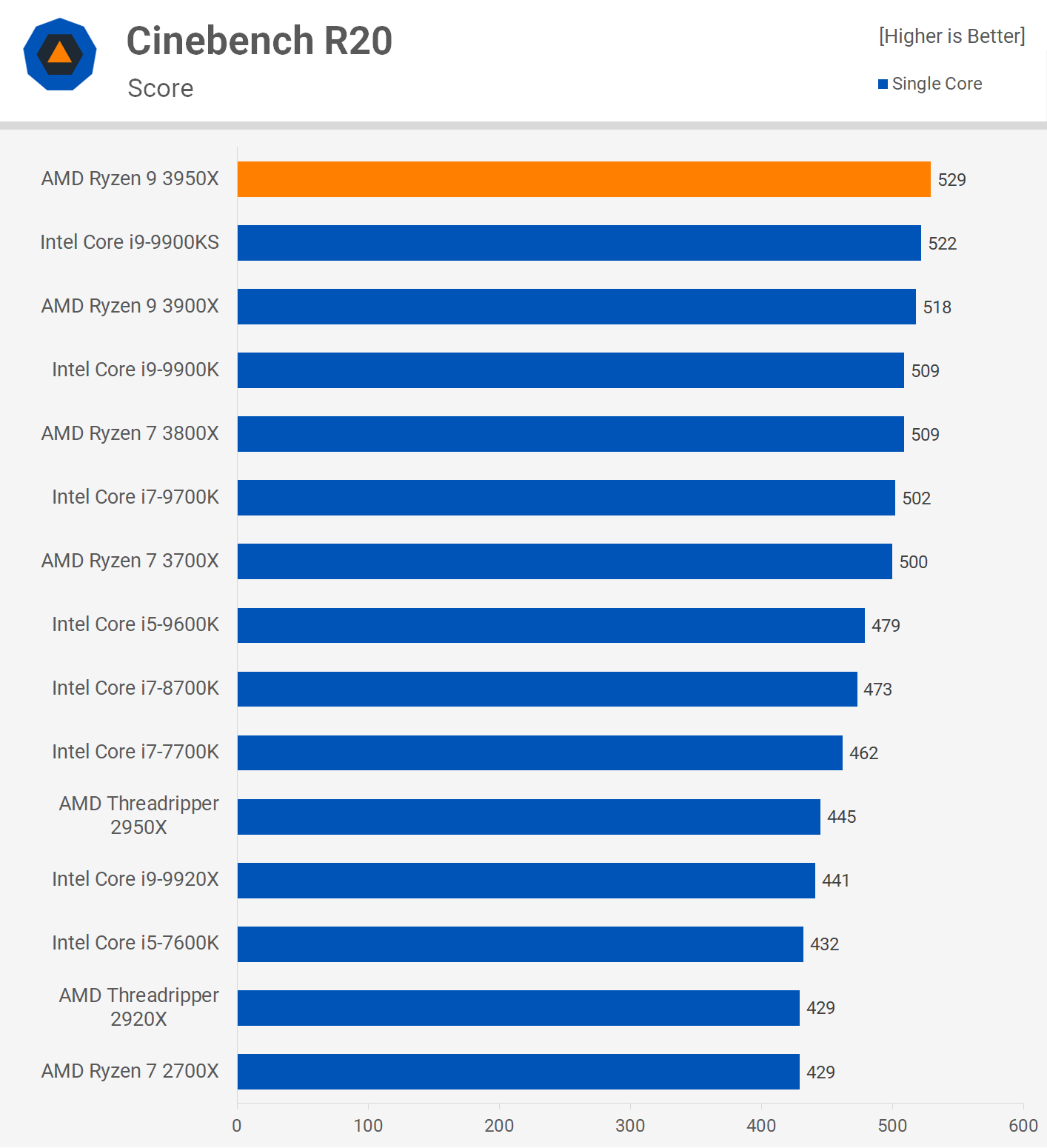
Here's a quick look at sustained memory bandwidth performance and as expected the 3950X is very similar to all other 3rd-gen Ryzen CPUs that we've tested so far.

WinRAR performance is drastically improved with the 3rd-gen Ryzen but even so the 12 and 16-core models still trail Intel's 8-core 9900K and are some way behind the 12-core 9920X.
The 3950X also didn't appear to improve upon the 3900X which is interesting, though we saw a similar thing with the Threadripper 2920X and 2950X, just to a slightly lesser degree.
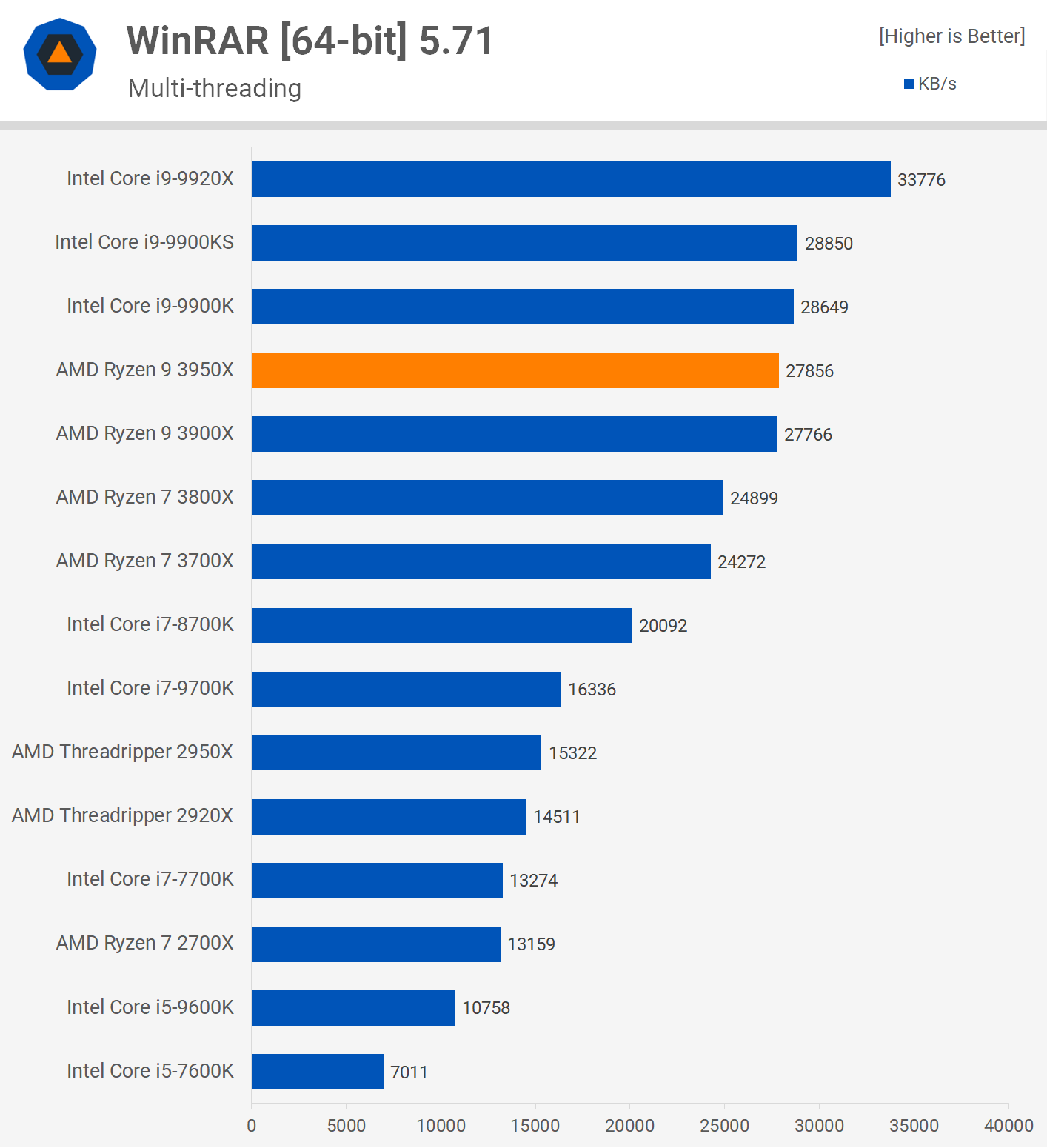
The 3950X is just 2% faster than the 3900X in 7-Zip's compression test and that meant while it was 8% faster than the 2950X, it was still 5% slower than the Core i9-9920X.
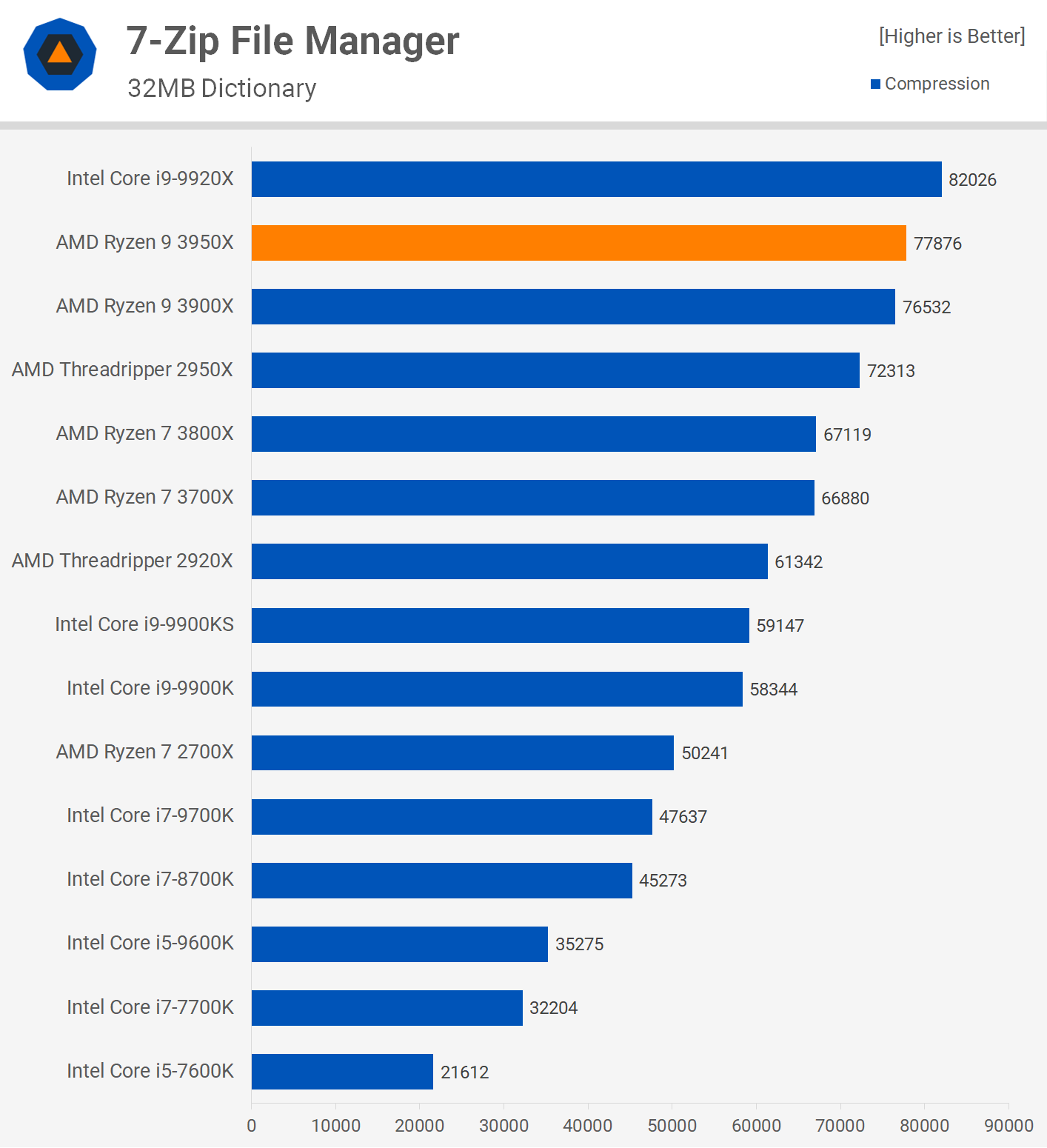
It's decompression work where Ryzen has always excelled and here the 3950X blows everything out of the water, beating the 9920X by an incredible 73% margin. It was also 25% faster than the 2950X and a little over 30% faster than the 3900X, so a great result for the new AM4 16-core processor.
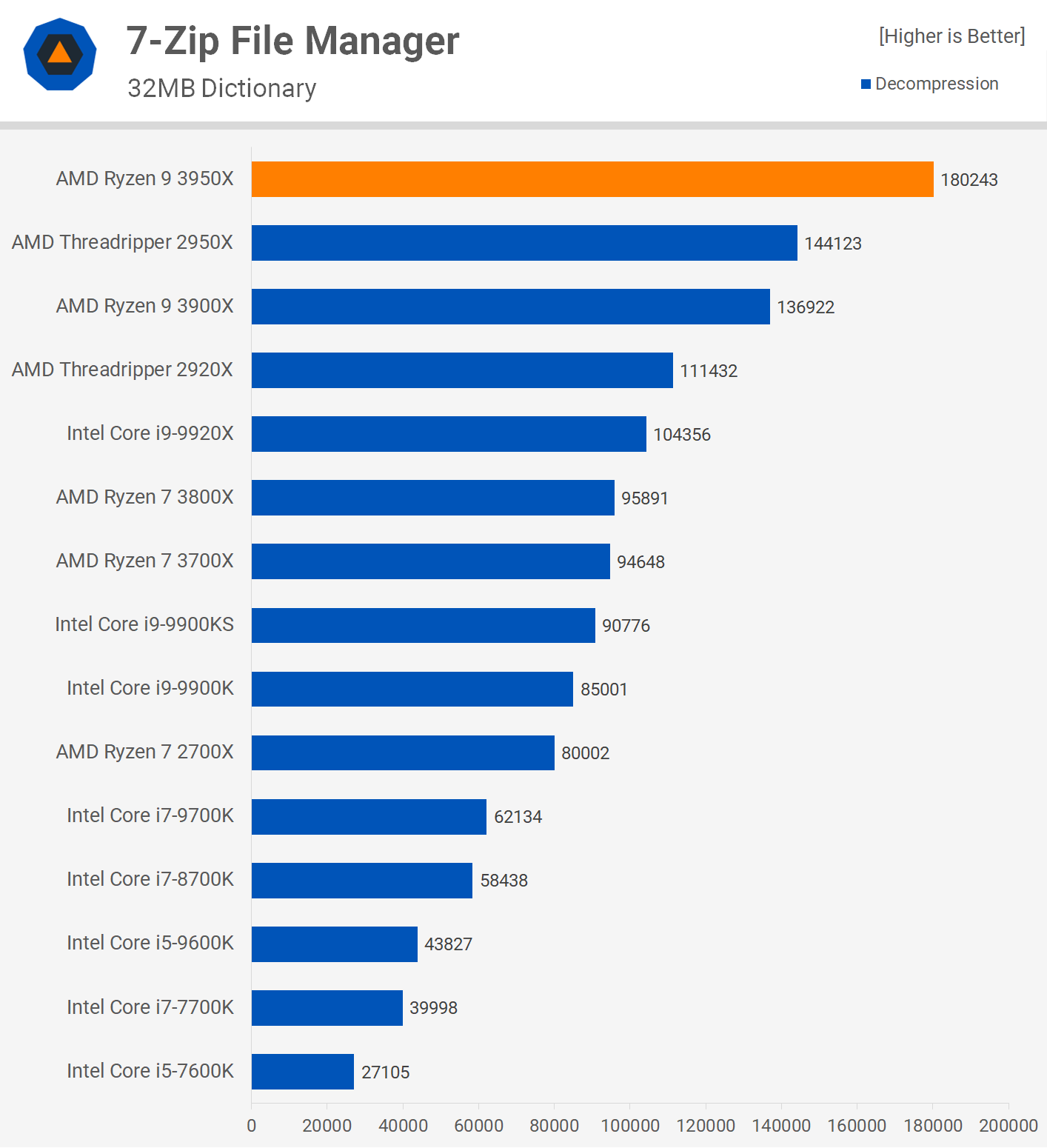
Unfortunately we see little to no performance gain over the 3900X when it comes to encoding performance in Adobe Premiere Pro CC 2020 edition. When compared to the 3900X, the 3950X was just 3% faster which is surprising given they operated at similar clock speeds in this test and CPU utilization was over 90% with both parts.
That said if we compare each processor side by side with the Windows Task manager open, you can quite clearly see four of the 3950X cores aren't being fully utilized and this is why the 3950X can't further distance itself from the 3900X.

The 3950X also performs well in the V-Ray benchmark, offering almost 30% more performance than the Core i9-9920X and over 80% more than the 9900K, so another really solid result for the red team.

Next up we have Corona where the 3950X was 25% faster than the 2950X which is a huge step forward. It was almost 30% faster than Intel's Core i9-9920X, as well as the 12-core 3900X. It also blew Intel's mainstream 9900K out of the water as it was 71% faster.

The last application benchmark we ran was Blender Open Data and here the 3950X offered a 29% improvement over the 3900X and 37% more performance than the 2950X. It also decimated the 9920X by a 56% margin and the 9900K by an 87% margin.
It's also crazy to think that about 3 years ago, the Core i7-7700K was the flagship mainstream desktop part, the 3950X is roughly 300% faster, for 130% more money.
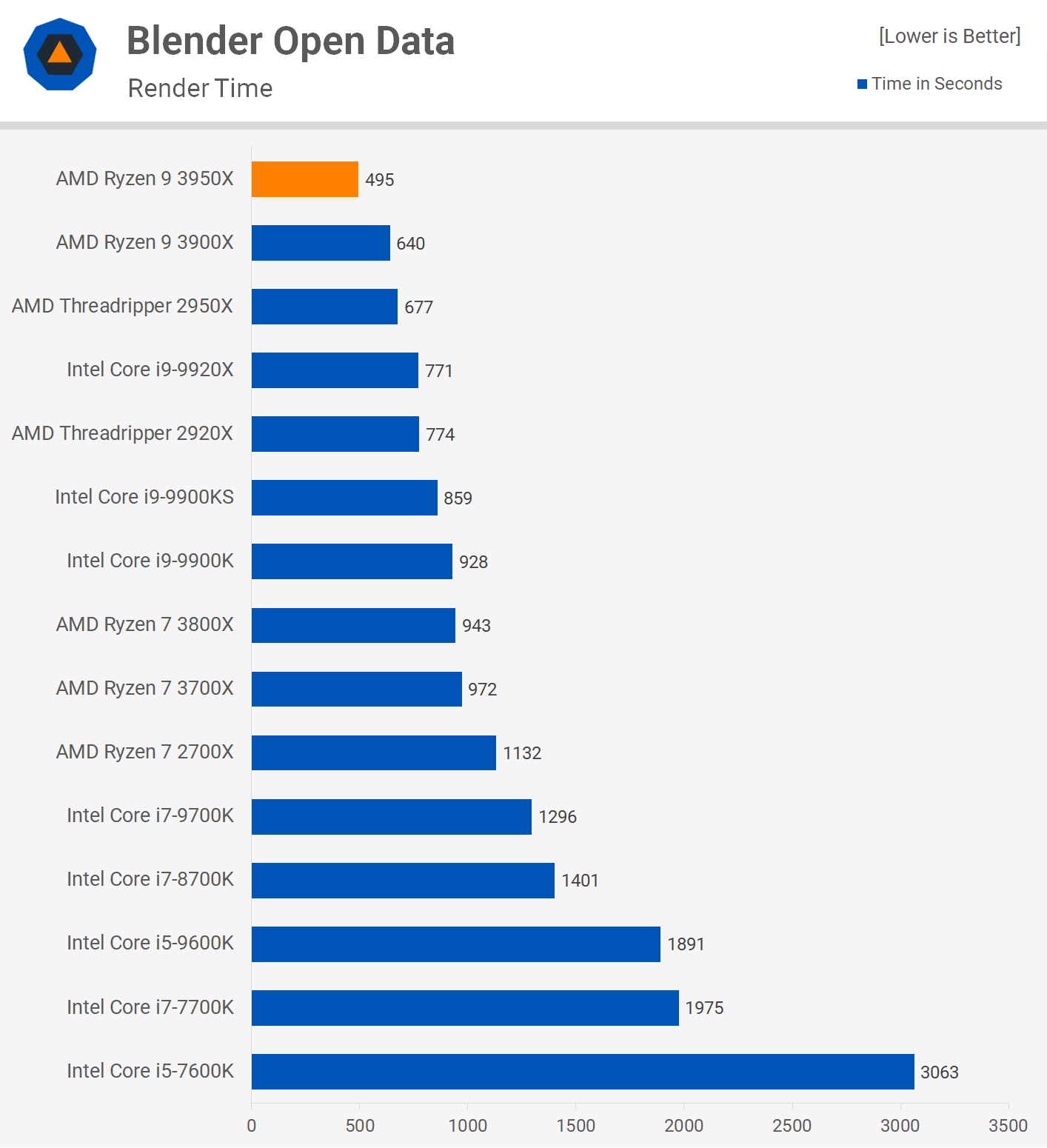
Power Consumption
Something unusual about the Ryzen 9 3950X and something that makes it special is just how efficient it is. Despite offering 29% more performance than the 3900X in the Blender benchmark, the 3950X actually consumed a few watts less, that's absolutely insane. This also means for an 87% performance boost over the 9900K, you're looking at identical power consumption.
Something unusual about the Ryzen 9 3950X and something that makes it special is just how efficient it is.
We've triple checked these results just to make sure, the 3950X and 3900X along with the other Ryzen processors were tested on the same board, with the same BIOS using the same settings and cooling. We also cross referenced the results with the folks over at Gamers Nexus and they found very similar power consumption figures, so we're confident in the accuracy of these numbers.
So why does the 3950X only push total system consumption to the same level as the 3900X? In a word: binning. It's just better silicon and therefore can operate at much lower voltages. Whereas the 3900X typically ran at between 1.275 and 1.3v, the 3950X ran at just 1.150v, meaning the 3900X required around 13% more voltage on average. Combine this with a 3% increase in clock speed and this is why the 3950X and 3900X consume similar levels of power.

Gaming Benchmarks
Time for some games. First up is Battlefield V using the DX12 API. Previously we had tested using DX11, so these are all updated results for this review. As you can see below, the 3950X is a whisker faster than the 3900X and that made it just a fraction slower than the 8700K and 9700K while it was 12% slower than the 9900K when comparing 1% low performance.
It was almost 30% faster than the 9920X when comparing 1% lows, for some reason Intel's current high-end desktop CPUs often run into performance issues when gaming.
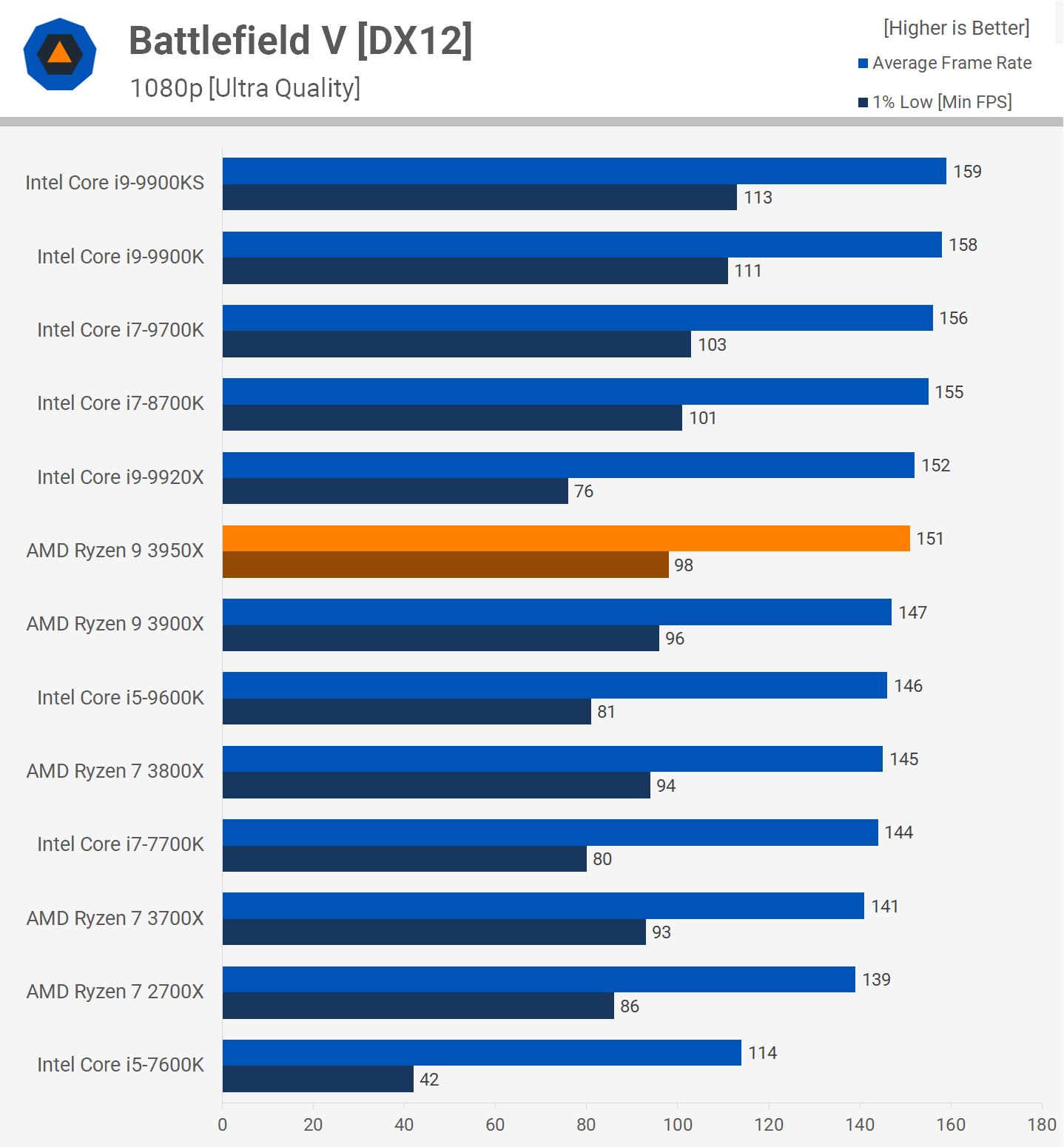
Bumping the resolution up to a more realistic scenario at 1440p with the RTX 2080 Ti, the 3950X is now just 7% slower than the 9900K when comparing 1% low data and again it basically matched the 9700K and 8700K. Again performance was also much more consistent when compared to the Core i9-9920X.
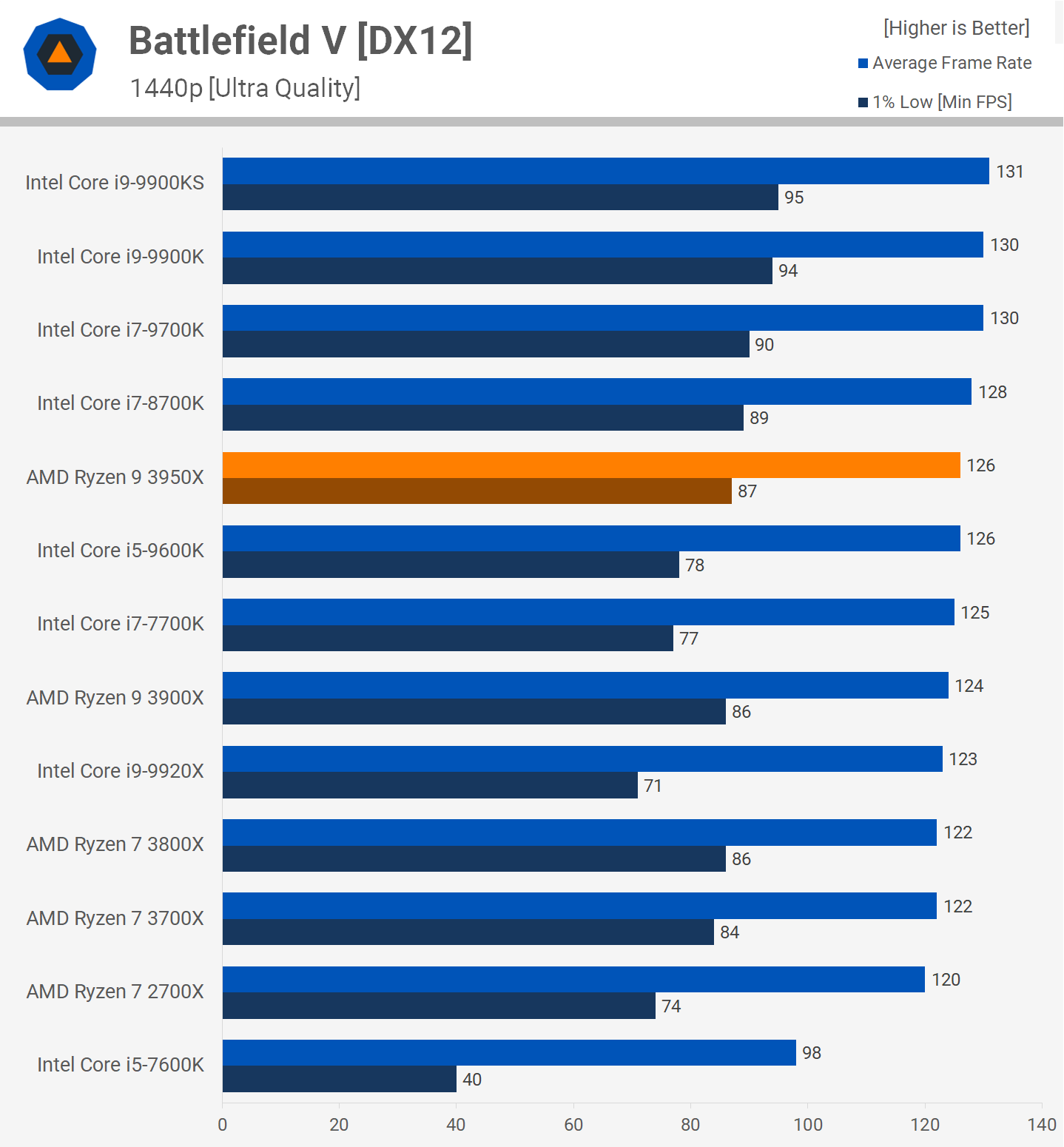
Performance with Shadow of the Tomb Raider is a little lackluster, here the 9900K was 16% faster for the average frame rate while the 9920X was 11% faster, the 3950X was also just a single frame faster than the 3900X.
Jumping up to 1440p we find the limits of the RTX 2080 Ti when using the highest quality preset. This was achieved by not just the 3950X, but also the 3900X and 3800X, as well as Intel Core i7-9700K and 9900KS. Oddly despite being much faster at 1080p the 9900K, 8700K and 9920X fall slightly behind at 1440p and we have seen this kind of thing before.
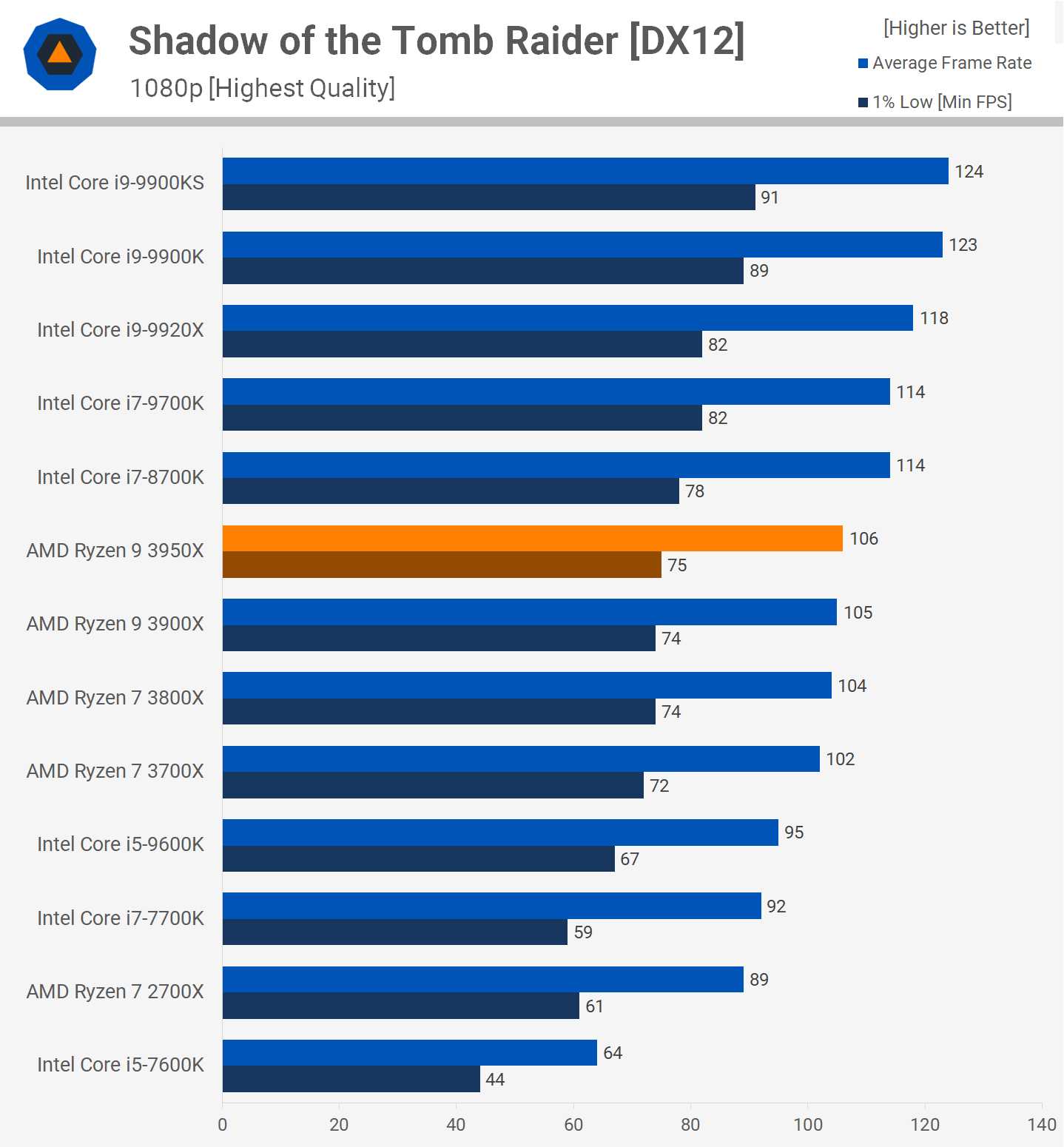
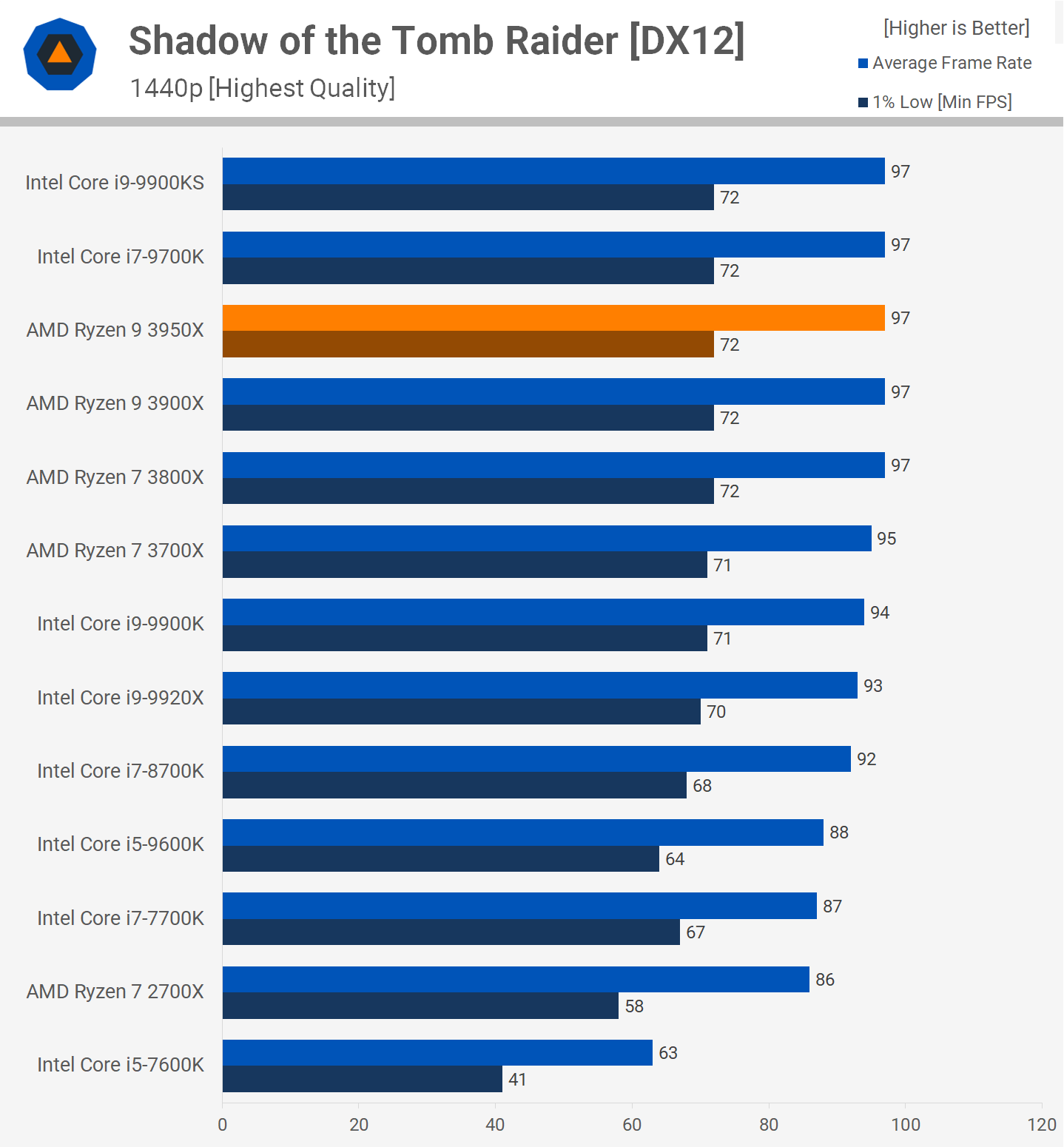
The Ryzen 9 3950X performs very well in The Division 2 at 1080p, basically matching the average frame rate of Intel's best, while offering a slightly higher 1% low result, though this is very much in line with what the 3900X delivered.

Bizarrely though, increasing the resolution messes everything up for Ryzen, as well as Intel's Core i9-9920X. The 3950X is now up to 10% slower than the 9700K, 9900K and 8700K, this is a very unexpected result given what was seen at 1080p.
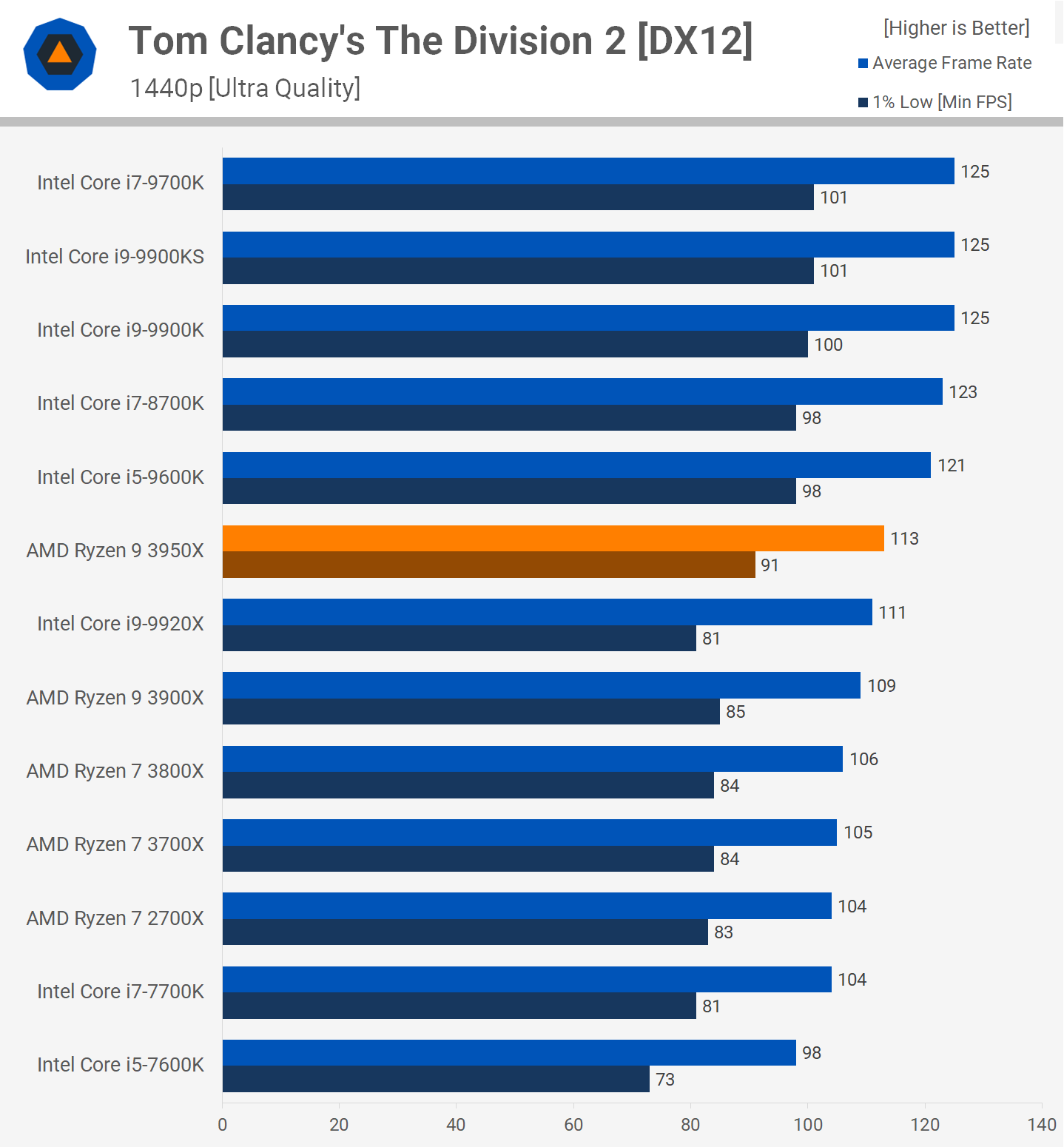
The 3950X was competitive in Ghost Recon Breakpoint, pushing the 2080 Ti within a few frames of what it achieved with the 9900KS while maintaining the same 1% low result.
Average frame rate performance did drop away a little for the Ryzen processors at 1440p, though they managed slightly stronger 1% low results. In fact, in our benchmark pass the 3950X, as well as the other Ryzen CPUs test, all provided very tight margins between the 1% low and average frame rates. This resulted in smooth performance, though the higher-end Intel processors were also very smooth.
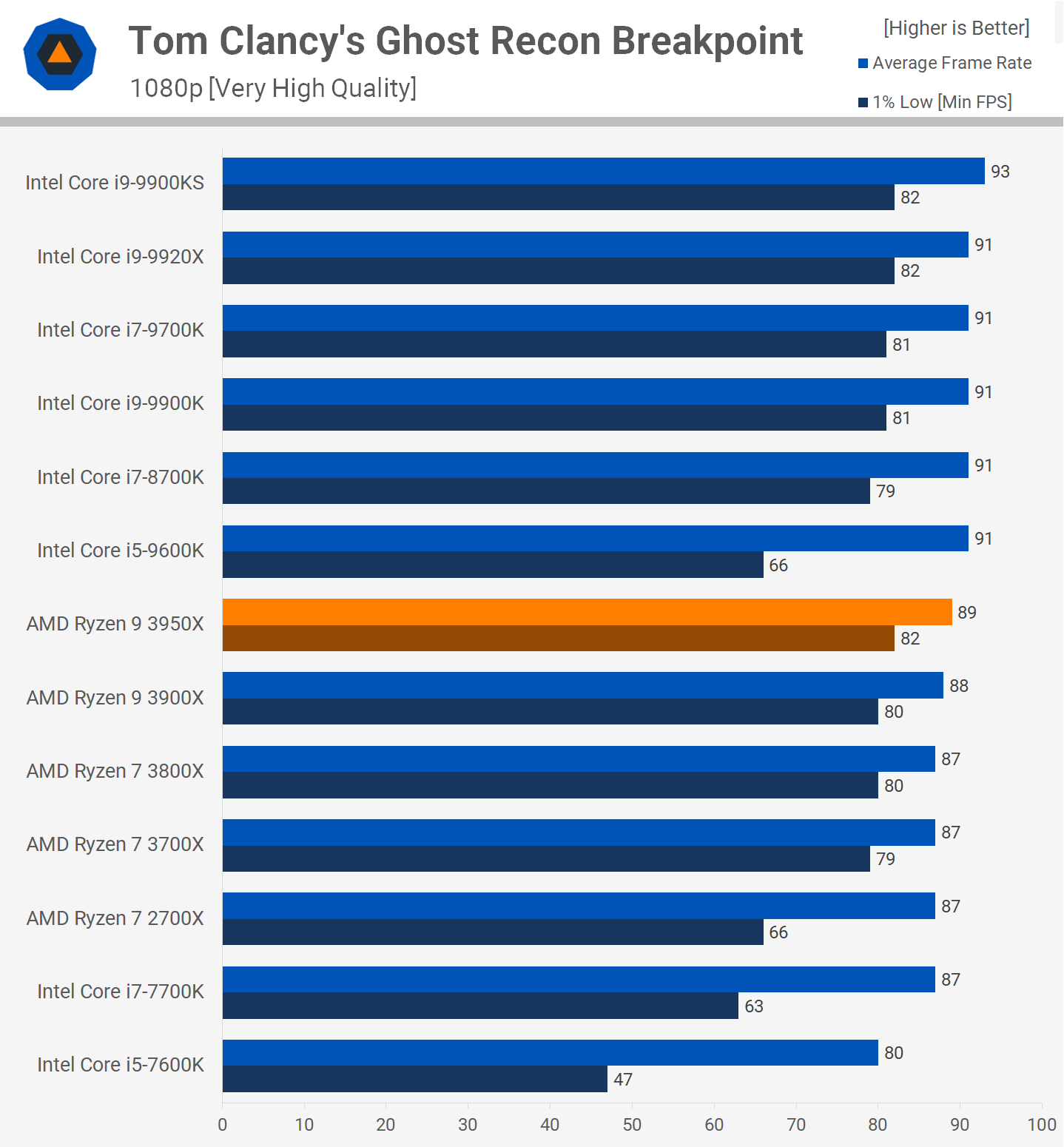
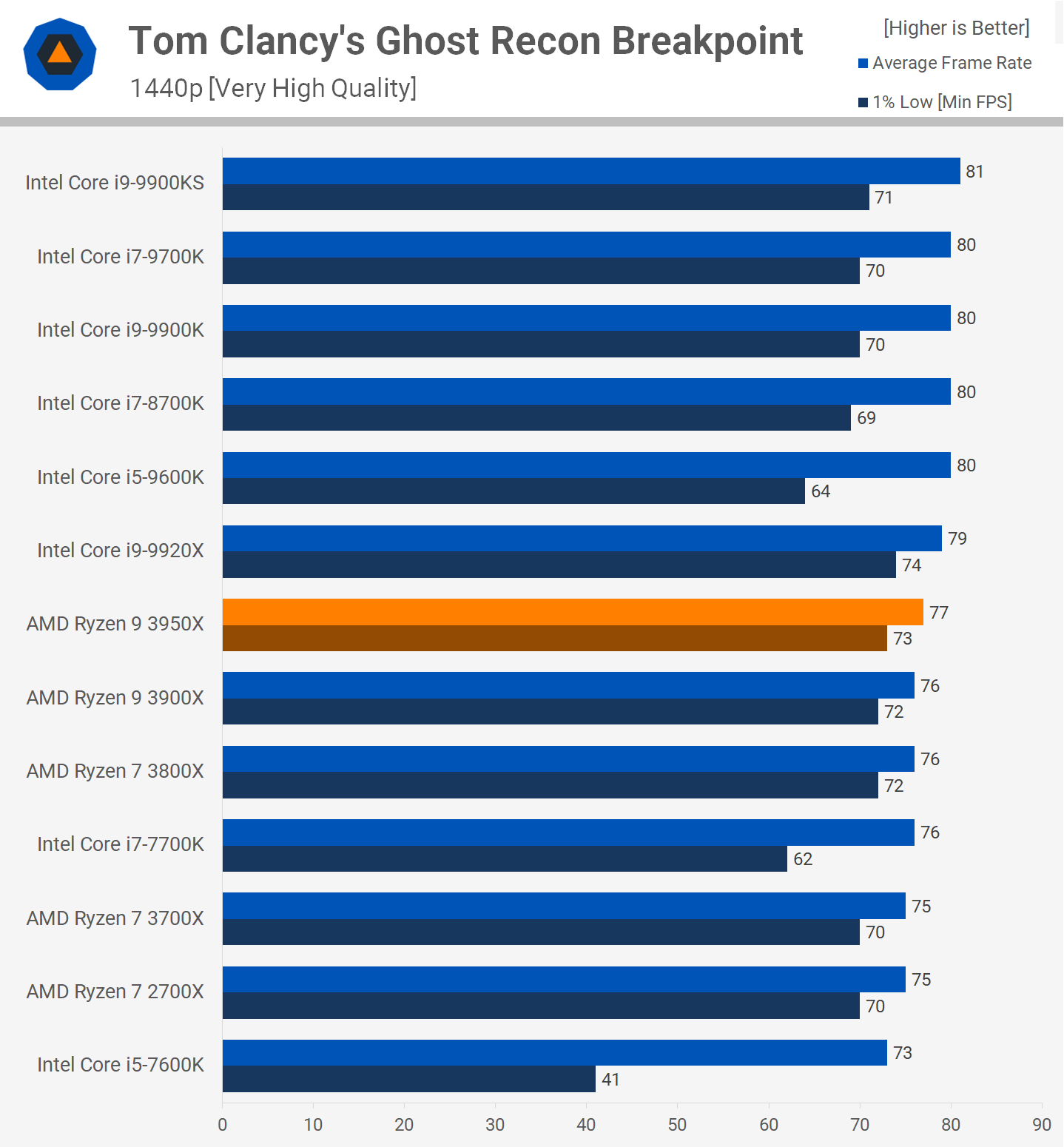
The F1 2019 results have also been updated with the DX12 API and here we see some positive results for the 3950X as it edged out both the Core i7-9700K and Core i9-9900K, losing out only to the 9900KS by a small margin.
Oddly though increasing the resolution sees the Ryzen processors drop off, as well as the Core i9-9920X and this is very much like what we saw when testing The Division 2. It's not a massive drop off, but given the 1080p results you would expect the 3950X to be trailing almost all Intel CPUs by a 5% margin at 1440p.
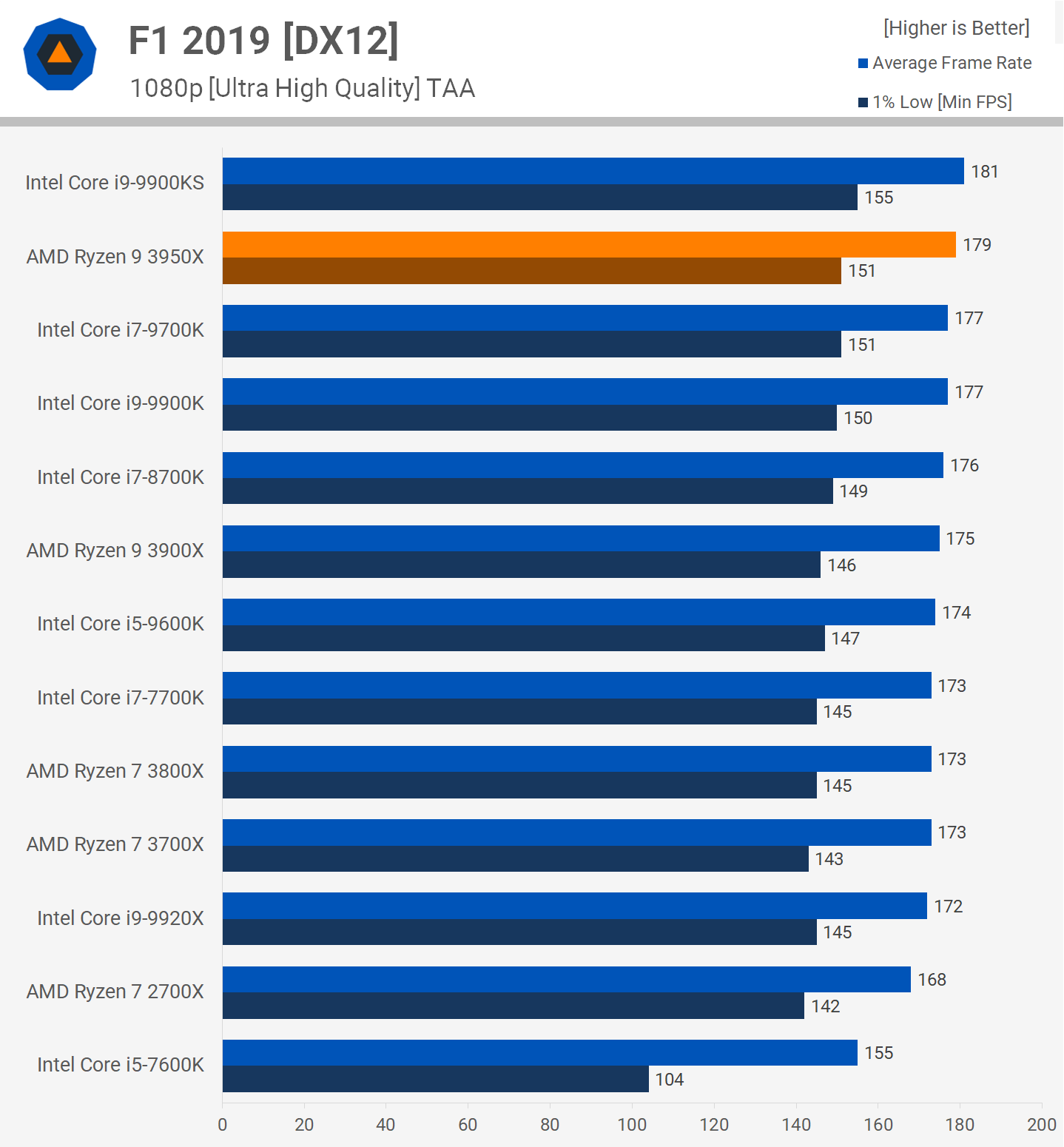
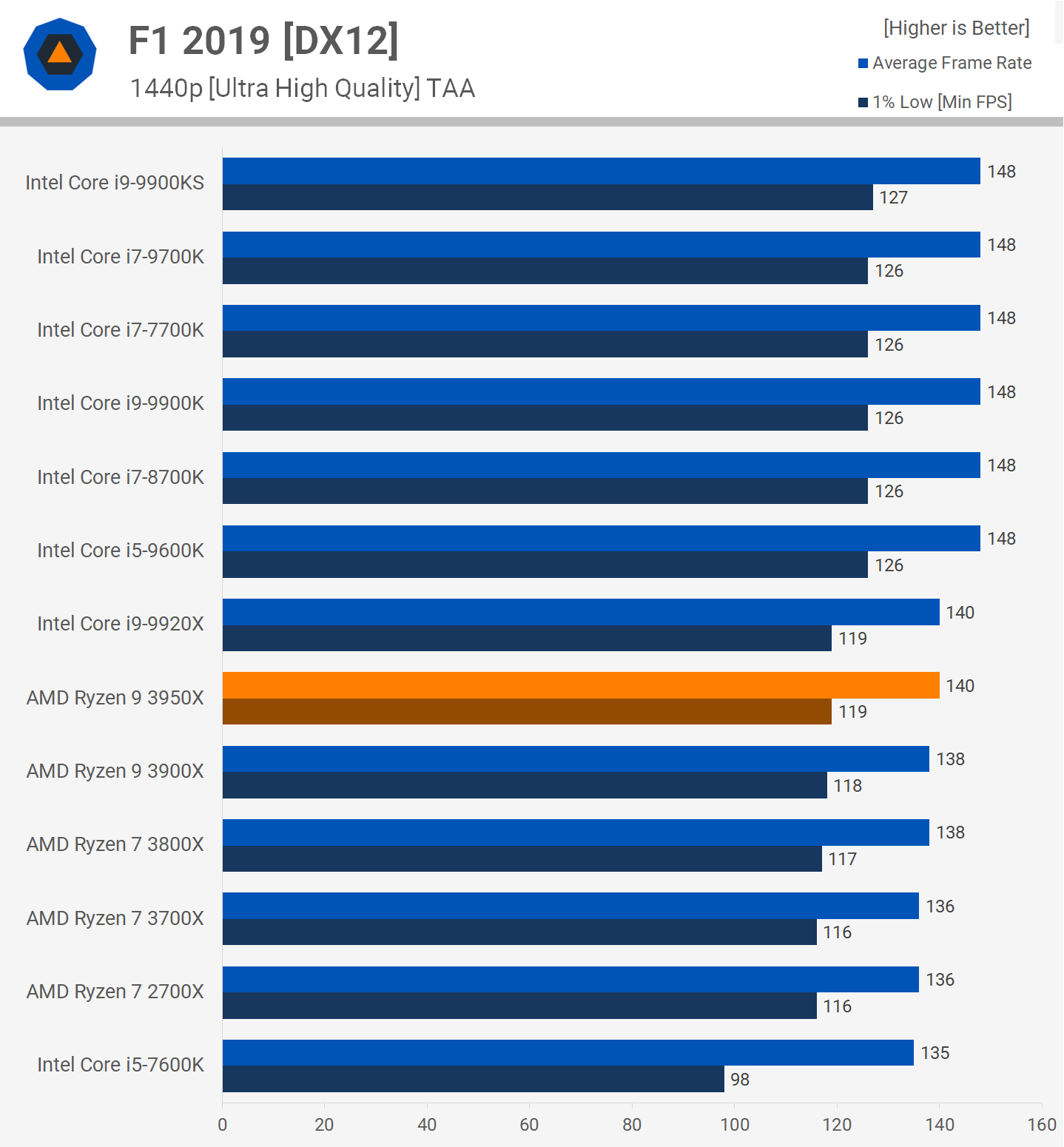
The last game we're going to look at is Borderlands 3 and again the 3950X can be seen performing well at 1080p. Here it matches the 9900KS, though it was no faster than the 3900X.
Even at 1440p it only matched the 3900X and despite being 2-3 fps down on the Intel CPUs, it was 1-2 fps faster for the 1% low result. So while this might not be the most CPU demanding game out there, the 3950X does well.
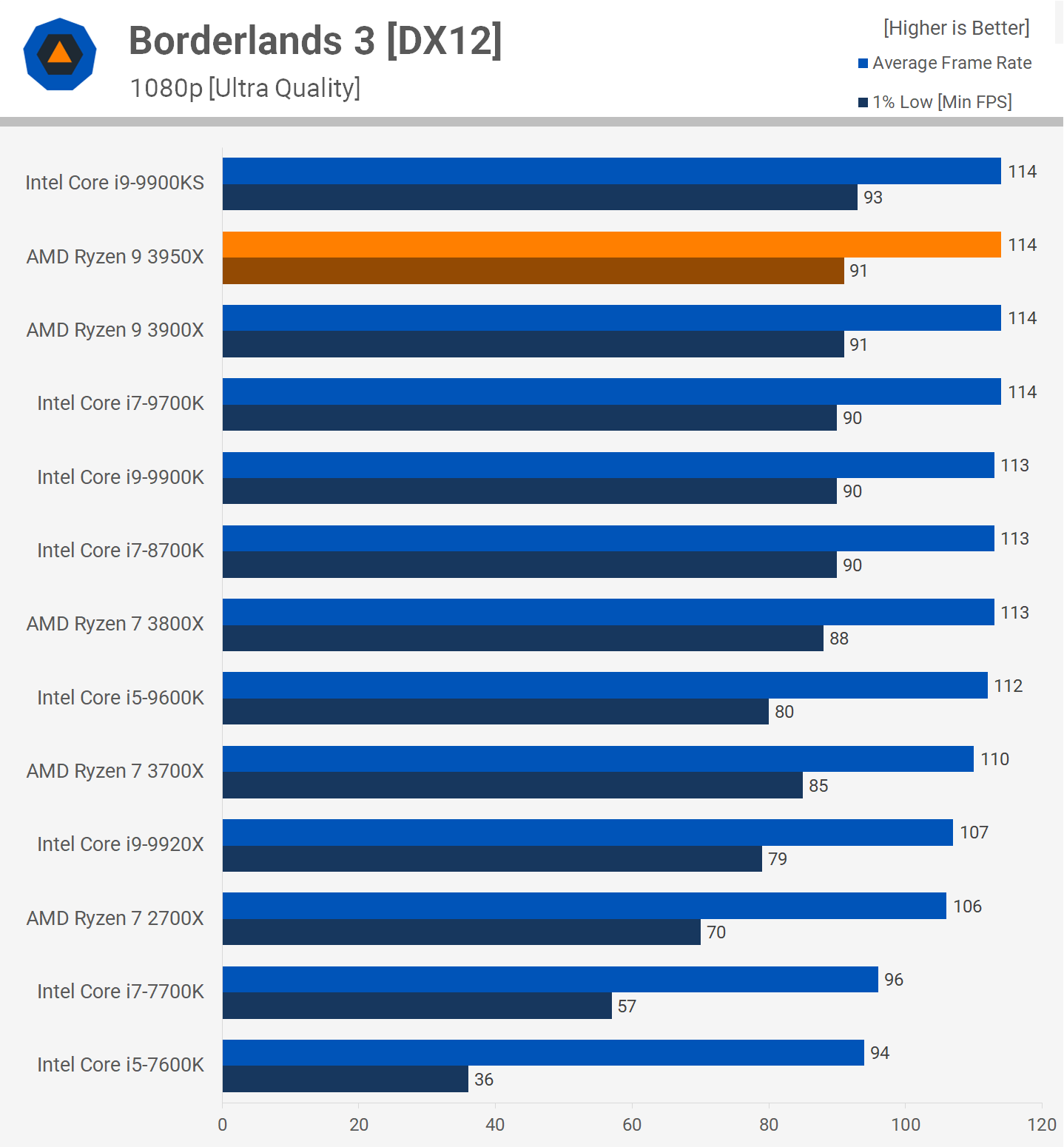
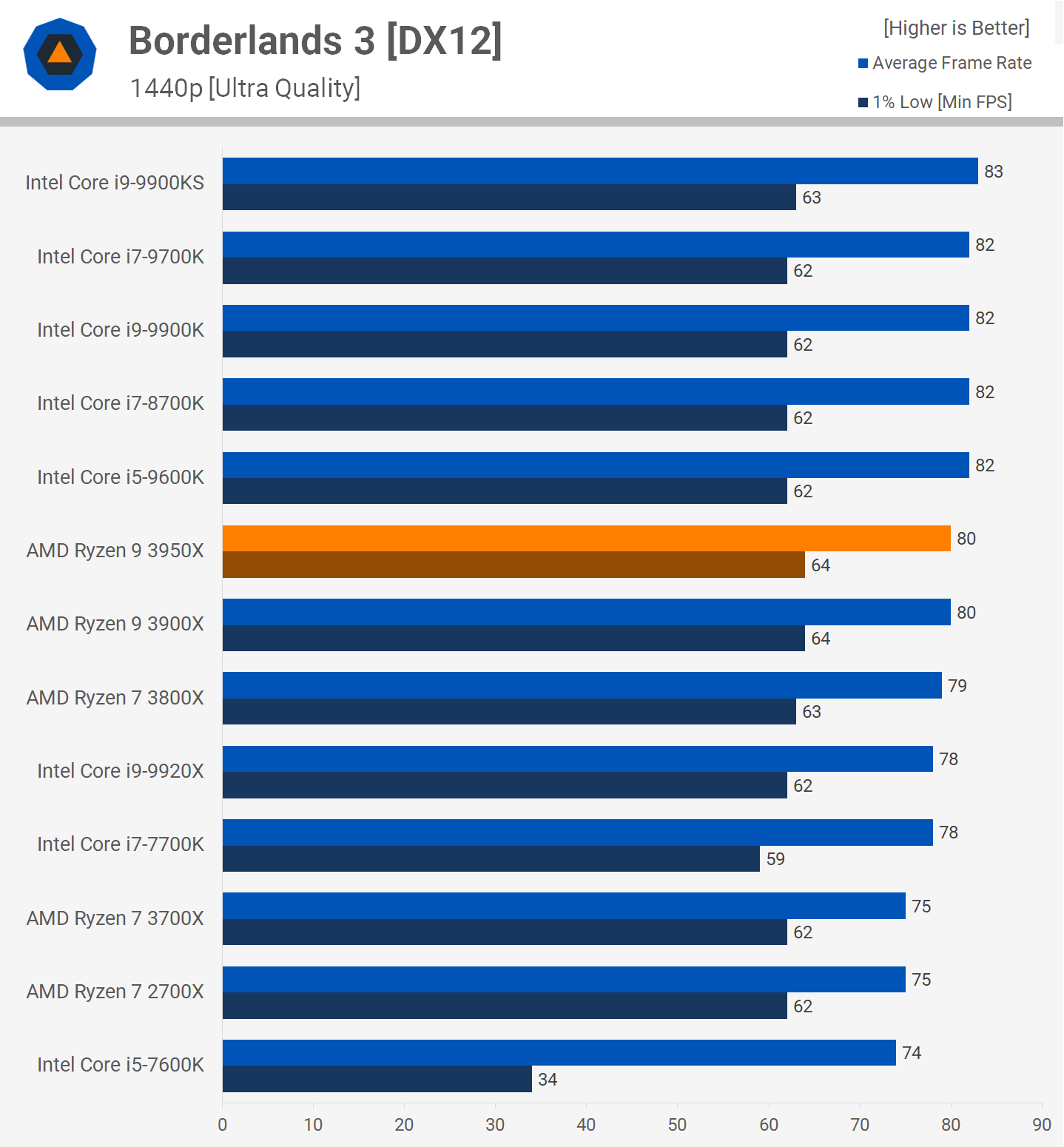
Overclocking
Here's a quick look at overclocking performance, using 1.325v the 3950X ran 100% stable at an all-core of 4.3 GHz. It's possible we could have pushed it to 4.4 GHz, but with limited time to validate the overclock we stopped at 4.3 GHz. We still broke the 10K barrier with a Cinebench score of 10046 pts, so that's a 9% performance bump. We also found that simply enabling PBO boosted performance by 5%.
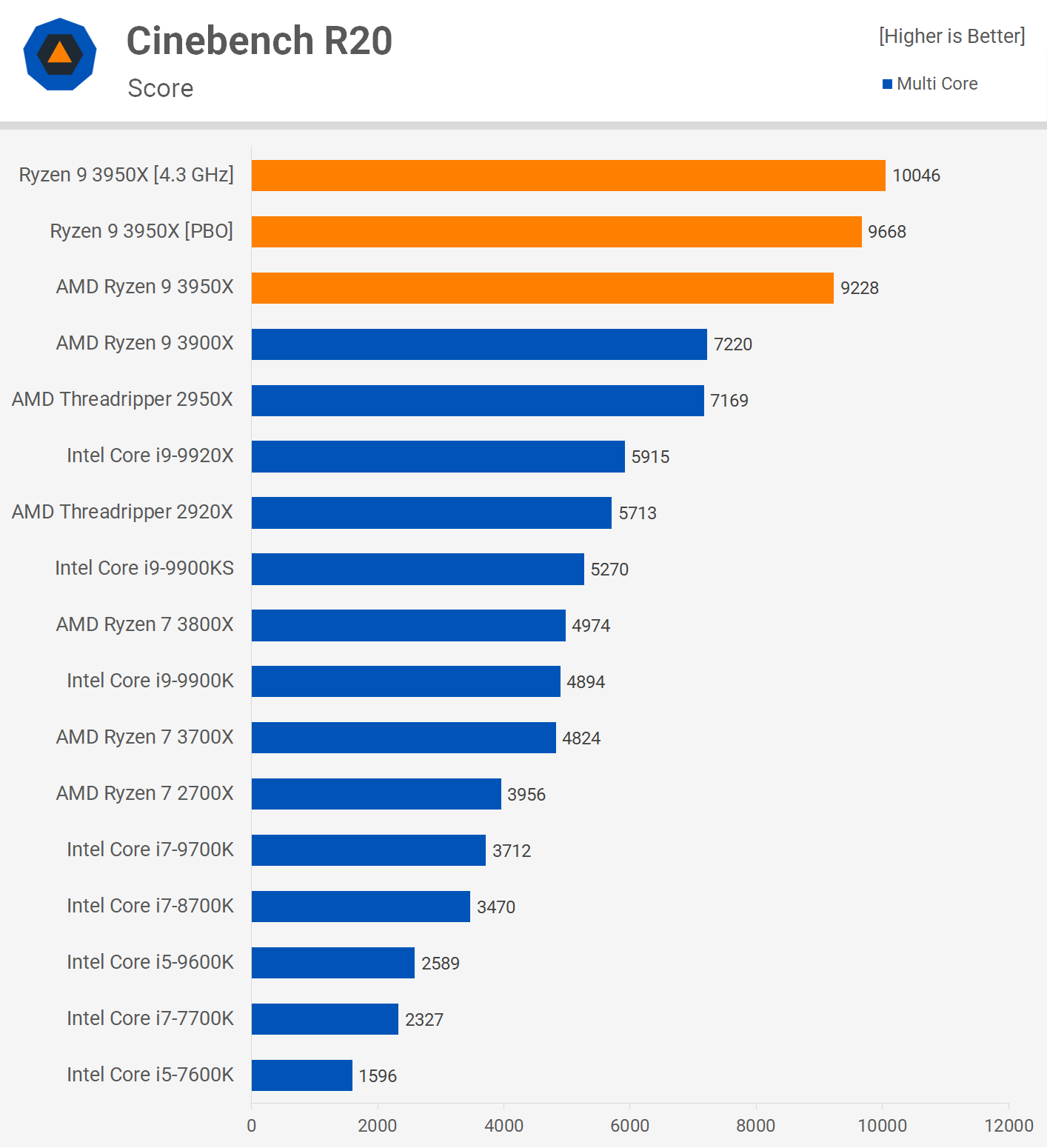
The gains in Blender were milder, here PBO boosted performance by 3%, while the manual overclock improved things by a 7% margin.
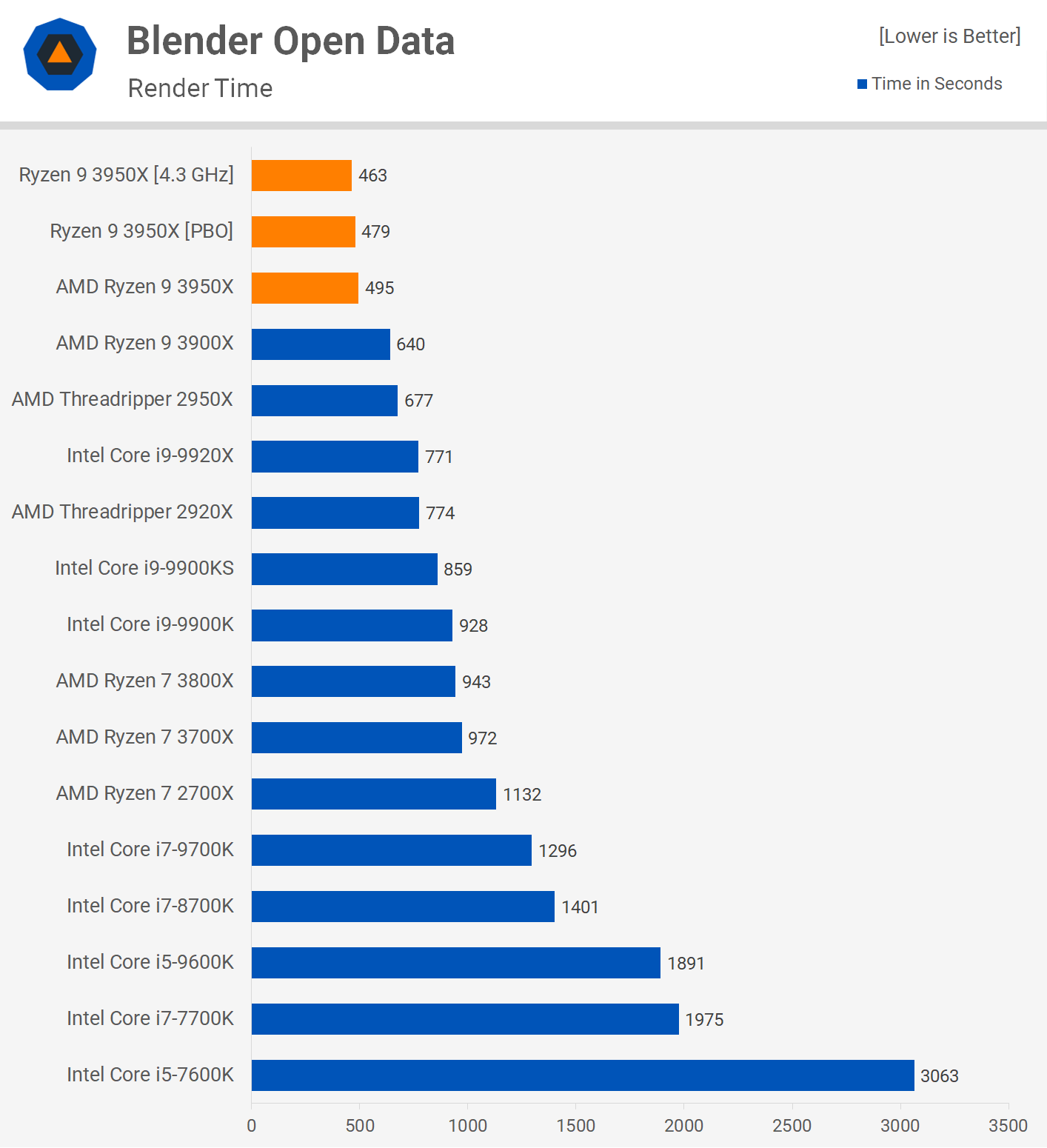
If you're after maximum performance at the cost of everything else, then overclocking the 3950X makes sense, but if you care at all about efficiency, then it really doesn't.
For the small 3-5% performance increase that PBO offers, you're looking at over a 25% increase in total system consumption and then an almost 40% increase for the 4.3 GHz manual overclock.
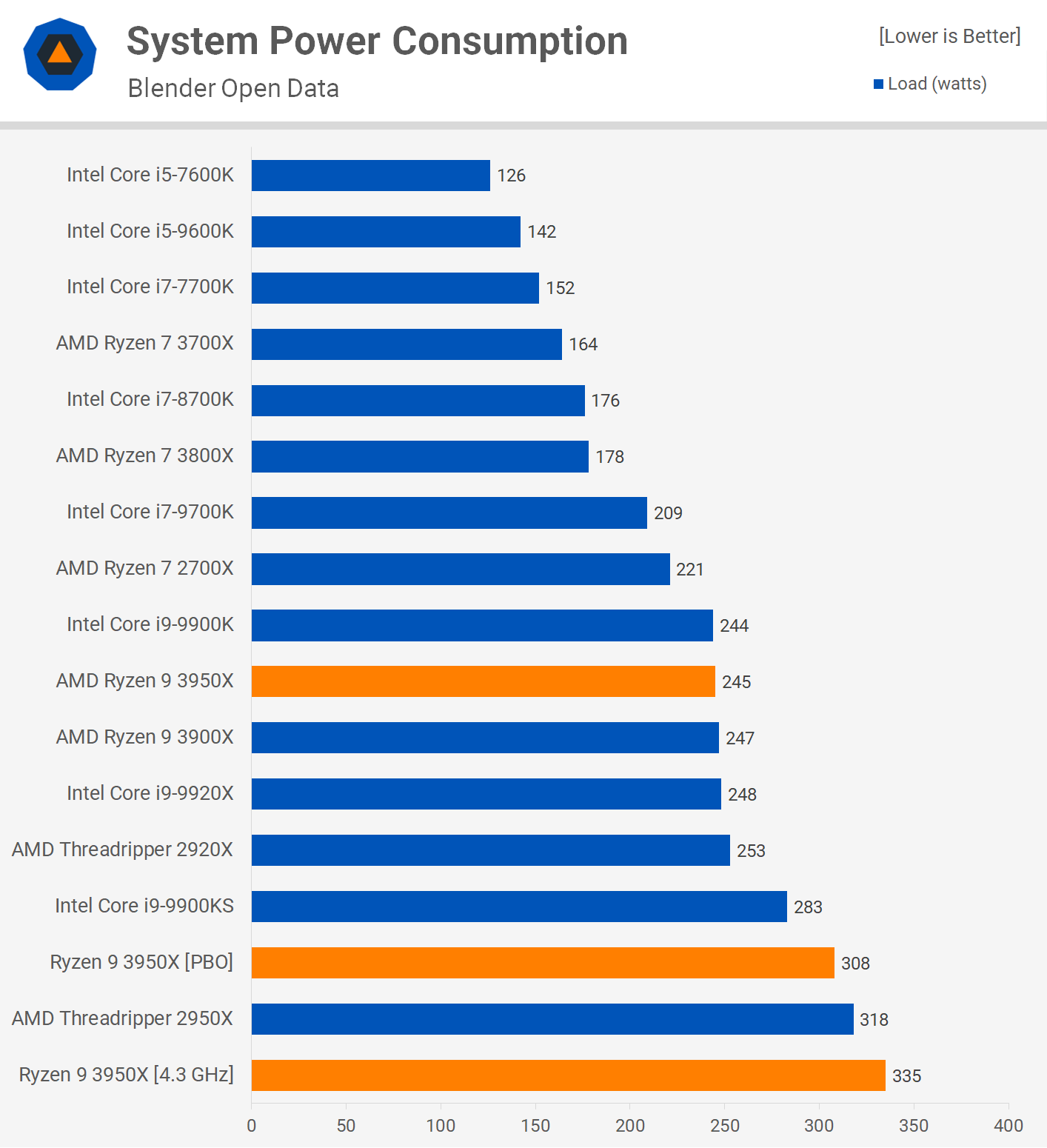
Due to limited time, we don't have a whole heap of thermal data for the 3950X, at least not with a range of different cooling solutions. For now we just have the data with the custom Corsair HydroX loop and for comparison we have thermal data with the 3900X.
Stock the 3950X peaked at just 64 C after an hour long Blender stress test in a 21c room. The CPU ran at 1.150v and maintained a clock speed of 4025 MHz by the end of the stress test.
For comparison, the 3900X peaked at 68 C under the same conditions, meaning the 3950X actually ran a tad cooler. The 3900X did maintain a clock speed of 4100 MHz, though as we saw when measuring power consumption, the voltage was a bit higher which resulted in the added heat.
In other words, any cooler capable of tackling the 3900X, will have no issue with the 3950X.
The New Performance King, But Who Is It For?
Going into this review, we were excited to finally test the Ryzen 9 3950X, however we weren't expecting any big surprises. It's basically a 3900X with four extra cores. All things being equal, it'll be up to 33% faster and we certainly saw that in applications such as 7-zip and Blender.
But when we measured power consumption, that's when we discovered just how impressive the 3950X is. We're still blown away by the fact that it offers almost 30% more performance, yet consumes a few watts less than the 3900X. The 3950X really showcases what's possible with TSMC's 7nm process.
This improvement in silicon quality does make the 12% price premium you pay per core for the 3950X over the 3900X worth it. As a side note though, if you match the 3900X and 3950X's clock speeds and voltage, the 16-core model does consume around 30-40% more power as you'd expect as it packs 33% more cores.
Over the past month or so, we've been asked a lot whether you should wait for the 3950X or just snap up a discounted Threadripper 2950X. Our advice has been to wait for 3950X reviews and we're happy that's what we suggested given how good the 3950X is. Right now the TR 2950X retails for $680 but it's around 30% slower and pushes total system consumption 30% higher. So in terms of performance and efficiency, the 2950X is the inferior choice except for those extra PCIe lanes.
The Ryzen 9 3950X also has the advantage of more affordable motherboards. You can throw this thing on a decent B450 board for a little over $100 and we'll be doing just that in a new review soon. Meanwhile a decent X399 board costs around $300. Ultimately we feel for most people the 3950X and 3900X have put down the 1st and 2nd-gen Threadripper series.
As for Intel, the R9 3950X is clearly a much better CPU than the $1,050 Core i9-9920X. However, that part will be refreshed very soon as the Core i9-10920X for only $700. While the 12-core Intel CPU consumes a similar level of power, it's often heavily outgunned in terms of raw performance. There are instances where the 10920X will win, but only by a slim margin, while there are plenty more instances where the 3950X completely buries it. For a similar level of workstation performance you'll need to spend $800 on the 10940X, or $1,000 on the 10980XE to beat AMD's finest AM4 CPU.
AMD has delivered a "mainstream" AM4 part that can rival and outcompete the best high-end desktop CPUs Intel has to offer. This explains why 3rd-gen Threadripper is so damn expensive as AMD looks to separate their mainstream and high-end desktop platforms. But with the $1,400 24-core 3960X offering more PCIe lanes than most of you'll know what to do with, and twice the L3 cache of the 3950X, 3rd-gen Threadripper is going to be truly high-end desktop stuff.
We'll get the chance to evaluate 3rd-gen Threadripper later this month, along with Intel's Cascade Lake-X series. But for now we're seriously impressed with what the 3950X offers at $750. It's an exceptionally good option for anyone after a powerful 16-core processor.
